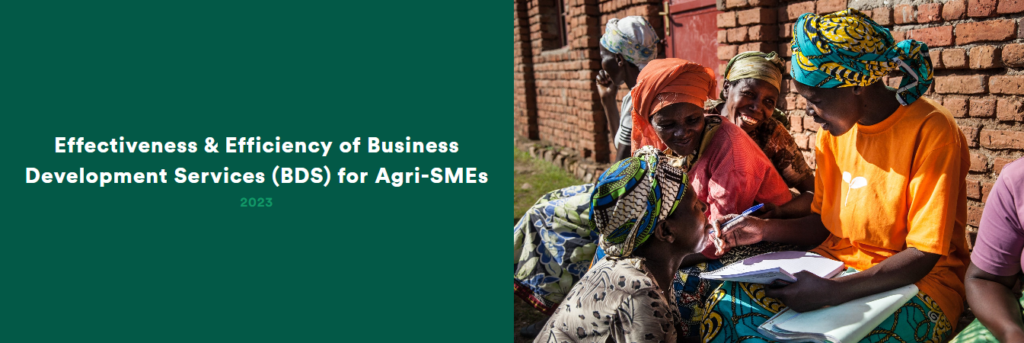How participation in data-driven agri-BDS studies changed ADC Uganda’s operations
In an ever-evolving and challenging agricultural sector, the ability to gather, analyze, and apply data has increasingly proven to be a game-changer for organizations supporting agricultural small and medium enterprises (agri-SMEs). For the Agribusiness Development Centre (ADC) Uganda, participation in a recent collaborative study (ISF Advisors in 2023) has significantly altered the way the organization collects, interprets, and utilizes data. These changes have not only enhanced their operations but have also helped them tailor services more effectively to meet the specific needs of their clients.
As AMEA starts a new phase of transforming learnings into action using the ISF methodology, we invite you to read ADC Uganda’s experience with participating in a similar process, and engage with AMEA in future studies. We hope this encourages you to benchmark your own work and adopt new practices.
THE ISF STUDY
AMEA worked closely with a Consortium of Partners to support ISF to conduct a study into support provided to over 500 agri-SMEs. The result was a ground-breaking study that was able to assess and benchmark the cost-effectiveness of that support. ADC Uganda was one of the 15 organizations to provide data for this study.
IMPROVING THE ASSESSMENT PROCESS AND SEGMENTING THE AGRI-SME CLIENT BASE
A key finding from the ISF study was that most segmentation approaches were rudimentary and should be improved. ADC also considered this a major takeaway from their involvement in the study.
The main value from participating in the study was the ability to tailor data collection to better understand and support the specific needs of our Agri-SME clients at different growth stages—Early Stage, Growing, and Advanced categories
Before this process, the organization faced certain challenges in its data collection approach, particularly around distinguishing between the varying needs of SMEs at different growth stages. “Prior to the study, our data collection lacked specificity,” Ms. Josephine Mukumbya, ADC Uganda’s Executive Director shared, explaining that this sometimes resulted in missing critical insights regarding the distinct challenges and opportunities faced by businesses at different points in their development.
Today, however, ADC Uganda has transformed its methods. They segment the Agri-SMEs they support based on key metrics, leading to more targeted interventions. Metrics such as permanent staff numbers, sales turnover, capital raised, and financing requirements have been incorporated into their assessment tools, resulting in a more focused approach to supporting the growth of their clients.
EVOLVING METRICS AND STRATEGIC DECISION-MAKING
The improvement of the assessment process also led to the expansion of types of data collected during and following support provided to agri-SMEs. New metrics, such as environmental, social governance (ESG) data, gender breakdowns, permanent staff/full-time equivalents, and sustainability and impact indicators, are now being tracked. This comprehensive data allows ADC Uganda to follow the growth trajectory of their clients more closely, leading to improved strategic decision-making.
Improved data collection has enabled us to make more informed strategic decisions by identifying the unique needs and challenges of our clients at each stage
This has allowed ADC Uganda to develop tailored training interventions, such as business acceleration, coaching, and mentorship programs, while also ensuring more effective resource allocation. Additionally, this improved, tailored approach has led to the development of stronger networks and relationships with their clients. ADC Uganda also experienced a reduction in costs due to segmentation, particularly by delivering more focused interventions. For more advanced clients, targeted support such as mentoring and coaching was prioritized over fully-fledged training programs, leading to significant savings in time and resources. This new focus on outcomes over cost of delivery has also made ADC Uganda a more accountable and efficient partner for funders.
ANCHORING THE CHANGE
ADC Uganda has already started to institutionalize the segmentation process for enterprises in all of its future programming interventions. As part of these efforts, internal capacity-building initiatives have been developed, including monitoring and evaluation workshops designed to ensure data quality and evidence-based decision-making across the team.
ADC Uganda is also focusing on the use of its in-house digital data collection and visualization platforms. These platforms have already proven to be effective tools in streamlining data collection and making the process more cost-effective.
COLLABORATION AND FUTURE DIRECTIONS
ADC Uganda’s collaboration with ISF Advisors and AMEA played a key role in influencing the organization’s approach to working with agri-SMEs. By embedding a more structured and data-driven approach, ADC Uganda has not only improved its service delivery but has also set a strong foundation for continued success.
This transformation showcases how strategic data collection and segmentation can create substantial value for organizations working in the agri-SME sector. For ADC Uganda, the process of refining its methods has not only enhanced operational efficiency but also strengthened its ability to support the unique needs of its clients, driving sustainable growth and positive outcomes across the board.
ADC Uganda looks forward to continuing to understand and adopt best practices, which is why they continue to invest in AMEA. The next phase of AMEA’s work is the Learning into Action Initiative, which includes analysis of other Uganda programs targeting agri-SMEs. The Learning into Action initiative aims to stimulate similar journeys to that ADC has embarked upon. Transformation of the Agricultural Sector also requires transformation of the Agricultural Business Development Services.

